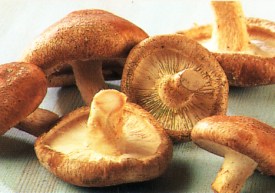Lentinula Edodes is a mushroom native to East Asia which is now cultivated worldwide for culinary and medicinal purposes. This mushroom is usually referred to as Shiitake, which is its Japanese common name based upon the “Shii” tree that the mushroom grows on.
Shiitake has been cultivated for over 1000 years. During the Ming Dynasty (AD 1368-1644) Chinese physician, Wu Jue, wrote that the mushroom could be used medicinally as a remedy for: upper respiratory tract infections, poor circulation, liver pathologies, exhaustion, premature aging and as a Qi (life-force) tonic.
Shiitake has a nutty and earthy taste making it a common delicacy of the culinary world. Many chefs prefer to use sun-dried Shiitake, the drying process seeming to enhance the flavour. Interestingly, the effect of UV light on the mushroom converts ergosterol into vitamin D making the sun-dried variety a significant dietary source of this vitamin. Shiitake is often sauteed in Chinese cuisine, used to flavour soup in Japanese cuisine and steamed, simmered or fried in Thai cuisine.
From a Naturopathic perspective, Shiitake is a fascinating mushroom due to its application in health care, ability to be easily incorporated into the diet and excellent safety profile. Current research is discovering that certain extracts of this mushroom have immune system regulation properties, antibacterial and anti-viral properties, and blood clot inhibiting properties.
A study published by the Journal of Microbiology and Biotechnology in 2009 discovered that polysaccharide extracts of Shiitake were shown to stimulate the function and activation of macrophages. Macrophages are white blood cells that are involved in the body’s initial response to infection (destroying pathogens and sending out chemical signals to the immune system to mount an attack on invading organisms).
In 2006 the Biological Pharmacology Bulletin published a study that examined the efficacy of a hot-water extract of Shiitake on protecting hepatocytes (liver cells) from the hepatotoxic agent D-galactosamine. The result was that 0.5 mg/ml of the Shiitake extract completely suppressed the cytotoxic (liver cell death inducing) effects of D-galactosamine. The study continued to examine the effect of injecting the Shiitake extract into rats treated with D-galactosamine. The result was less leakage of AST and ALT (both chemical markers of liver cell injury).
Lentinan, a common extraction of Shiitake used for medicinal purposes, was researched with regard to its immune regulatory applications in people with HIV. In 1998 the Journal of Medicine (AIDS Activities Division, San Francisco General Hospital) conducted a double blind placebo control trial on 98 patients with HIV. Patients were administered either 2, 5, or 10mg of Lentinan or placebo via I.V. once a week for eight weeks. Side effects of the I.V. administered Lentinan were generally mild when administered over a 30-minute period. The patients in the study receiving Lentinan demonstrated a trend toward increases in CD4 cells (these are the white blood cells that are targeted for destruction by HIV) and in some patients, increased neutrophil (the primary white blood cell involved in the acute response of the immune system to infection) activity.
Like all things we ingest, there is potential for allergic reaction to Shiitake. Be careful and observant when ingesting crude Shiitake or Shiitake extract for the first time.



